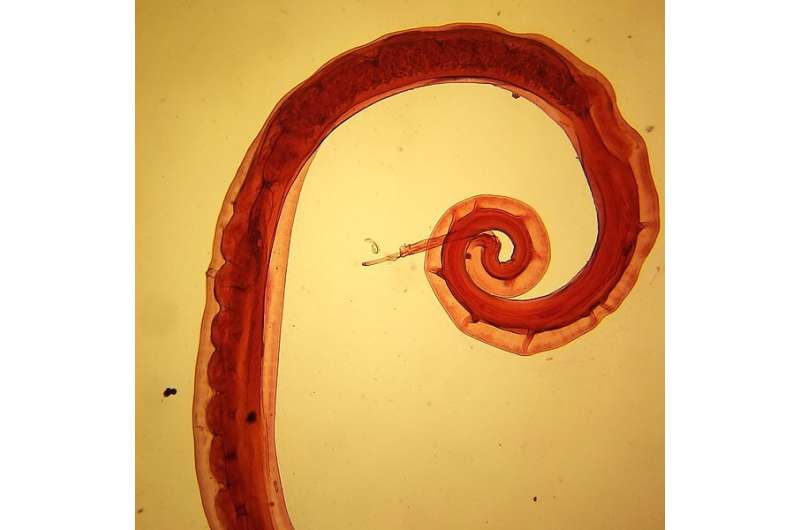This article has been reviewed according to Science X's editorial process and policies. Editors have highlighted the following attributes while ensuring the content's credibility:
fact-checked
peer-reviewed publication
proofread
New treatment for human parasitic worm infections shows high efficacy

Soil-transmitted helminth infections are caused by different species of parasitic worms, including whipworms, hookworms and roundworms. Worldwide, more than 1.5 billion people are infected with at least one soil-transmitted helminth, with most of the infected population living in low- and middle-income countries.
Infected people can experience symptoms like stomach pain, diarrhea and anemia, while heavy infections can lead to malnutrition, impaired growth and physical development. In severe cases, it can even cause blockages in the intestine that may require surgery.
To treat soil-transmitted helminth infections, safe drugs are available but the efficacy varies widely. The current treatments recommended by the World Health Organization (WHO) are albendazole and mebendazole. However, in the case of the whipworm Trichuris trichiura, a single dose of these drugs can only cure 17% of the infected people as shown in this study. Moreover, as drug resistance is on the rise, new alternative treatments are urgently needed.
All patients cured
To fill the anthelminthic drug pipeline, Swiss TPH researchers have now tested the drug emodepside for the first time in humans infected with soil-transmitted helminths in a phase IIa study.
"In this study, Emodepside showed high cure rates for all three soil-transmitted helminths," said Emmanuel Mrimi, Ph.D. candidate and first author of the study. The lowest dose tested, 5 mg of emodepside, cured 83% of people infected with whipworm. "An increase of emodepside to 15 mg resulted in complete cure of all people. Curing people infected with whipworm has never been achieved with the current anthelminthic treatments." In addition, high efficacy was also observed against roundworm and hookworm.
"The drug has also other important characteristics. It is well tolerated and most adverse events in the trial were mild," said Mrimi. The results have been published today in the New England Journal of Medicine.
From innovation to application
Emodepside is an anthelminthic treatment used to date in veterinary medicine. "Drug repurposing is a key strategy in research for anthelminthic drug discovery and development that is neglected and underfunded," said Jennifer Keiser, Head of the Helminth Drug Development unit, "most repurposed drugs come from veterinary medicine."
Swiss TPH already tested the drug in laboratory studies. "Based on the promising results in the laboratory, we saw the potential for treating patients infected with soil-transmitted helminths," said Jennifer Keiser. That is why the drug was taken forward. "The recent results of the clinical trials are important and good news in the field of neglected tropical diseases. No new anthelminthic has been developed in the past decades. So this is a huge milestone towards controlling and eliminating soil-transmitted helminthiases."
Swiss TPH will now join forces with the life science company Bayer on the further development of the drug. "The aim is to have it approved for use in humans and to make it available to patients in need in the future," said Keiser.
More information: Emodepside for Trichuris trichiura and Hookworm Infection, New England Journal of Medicine (2023). DOI: 10.1056/NEJMoa2212825




















